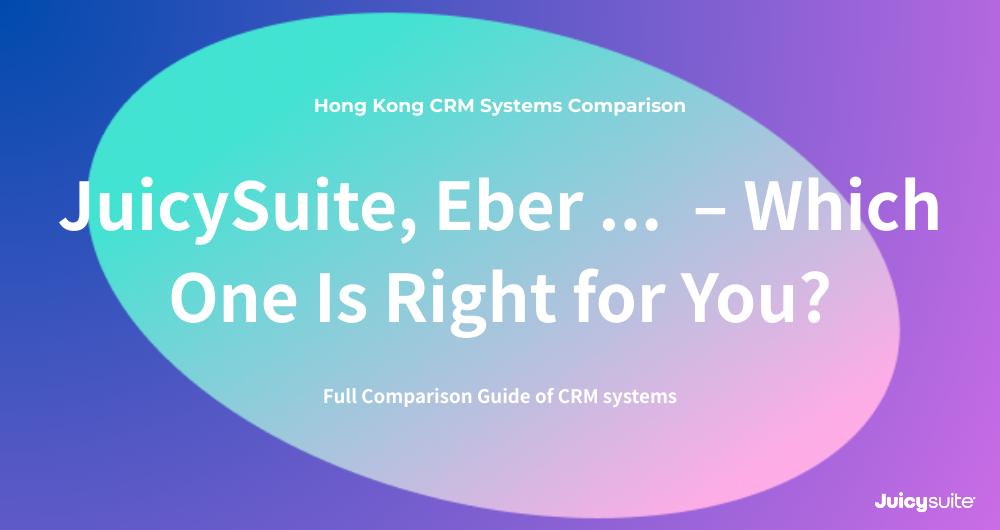Unlocking the Buyer’s Black Box with CRM: How Data Powers Your Marketing Strategy

CRM is no longer just about storing customer data. A powerful Customer Relationship Management (CRM) system helps businesses understand customer behavior, uncover valuable insights, and design targeted, personalized marketing strategies. The result? Higher conversion rates, stronger customer loyalty, and increased revenue.
Key Takeaways
- CRM is more than just a customer database
- It helps businesses decode the Buyer’s Black Box using real customer data
- Data is the foundation of any effective, insight-driven marketing strategy
- CRM enables personalized and automated experiences that drive sales and loyalty
- JuicySuite offers complete CRM services — from custom membership apps and wallet passes to segmentation and analytics
What Is CRM?
Contrary to popular belief, CRM isn’t just for big companies. In fact, over 90% of SMEs with more than 11 employees use CRM systems. A CRM:
- Collects and organizes digital footprints from your website, e-shop, and social platforms
- Provides data to create personalized customer journeys
- Supports marketing, sales, and customer service teams with real-time information
CRM isn’t just a tool — it’s the backbone of customer-centric business operations.
What Is the Buyer’s Black Box?
As a marketer, you’ve probably faced challenges like these:
- Your ad campaign gets great reach but low conversions
- Website traffic spikes but you don’t know which channel caused it
- You worked with several KOLs but can’t tell which one drove real engagement
This gap in understanding is called the Buyer’s Black Box. Coined by marketing guru Philip Kotler in the Stimulus-Response Model, it refers to the unknown mental and emotional process a customer goes through before making a decision.
“The real distance between your brand and your customer is this Black Box.”
While external factors (ads, channels, prices) are measurable and manageable, the internal decision-making process often isn’t — unless you’re capturing the right data.
From Digital Footprints to Insight-Driven Strategy
Your website, online store, and social platforms generate valuable digital footprints — traces of user behavior across digital touchpoints. But not all data is equally useful. You need to analyze the customer journey and prioritize insights that matter most.
What Kind of Data Should You Capture?
Here’s how to make sense of visitor activity:
- Where did they come from?
Social media, organic search, paid search, etc. - Which pages did they visit?
Homepage, product pages, store locator, etc. - What actions did they take?
Did they leave without action? Add items to cart or wishlist? Complete purchase? - What’s the conversion behavior?
Which channels are most cost-effective?
What types of customers do different channels attract? - Which pages have the highest engagement?
Where do users spend the most time?
Which products get clicks but not purchases?
The goal is to turn raw data into actionable insights that inform your strategy.
How CRM Captures and Uses These Insights
CRM helps capture user actions at every stage of the Customer Lifecycle, across marketing, sales, and support:
“CRM transforms abstract goals into concrete steps.”
Practical CRM Applications Across the Funnel
CRM helps brands guide customers through every stage of the funnel by turning data into actionable strategies. From awareness to loyalty, CRM makes every step more personalized and effective.
Key applications:
- Build brand awareness: Use segmentation and A/B testing to target the right audience.
- Acquire leads: Collect contact info via promotions and website tools; track behaviors for personalization.
- Convert leads: Send timely, behavior-based messages (e.g. promo codes after cart inactivity).
- Support customers: Automate responses, resolve issues quickly, and strengthen relationships.
- Drive upsells: Recommend relevant products, reward loyal customers, and encourage repeat purchases.
CRM ensures smoother, smarter interactions that boost conversion and customer lifetime value.
Automating the CRM Journey
Modern CRM systems also allow full automation of data collection, analysis, and outreach. For example:
- Automatically send emails or offers based on user behavior
- Use cookies to track anonymous sessions and trigger timely pop-ups
- Segment audiences dynamically and push relevant messages through multiple touchpoints
CRM and automation work hand-in-hand to minimize manual workload while maximizing personalization.
Final Thoughts: CRM Is Your Key to Unlocking Growth
CRM isn’t just a sales tool — it’s a strategic asset that helps businesses:
- Understand customer behavior
- Design more personalized journeys
- Automate interactions
- Build loyalty ecosystems
At JuicySuite, we help businesses develop the right CRM system for their needs — from loyalty apps and wallet passes to analytics dashboards and personalized workflows.
Ready to unlock your customers’ Black Box? Contact JuicySuite today for a free consultation and CRM demo.

.png)
.png)